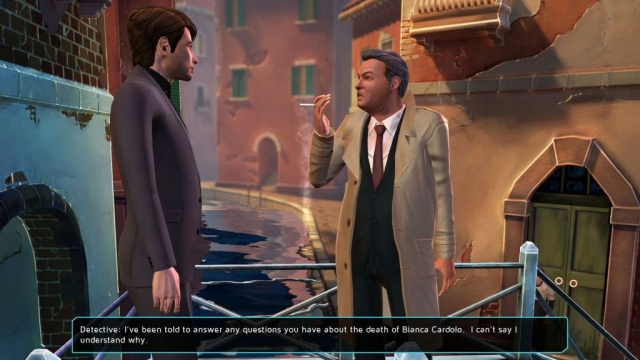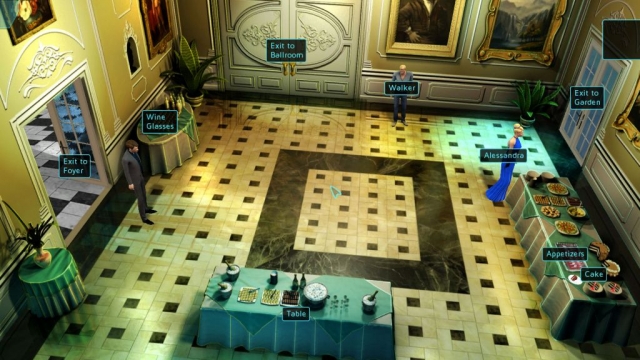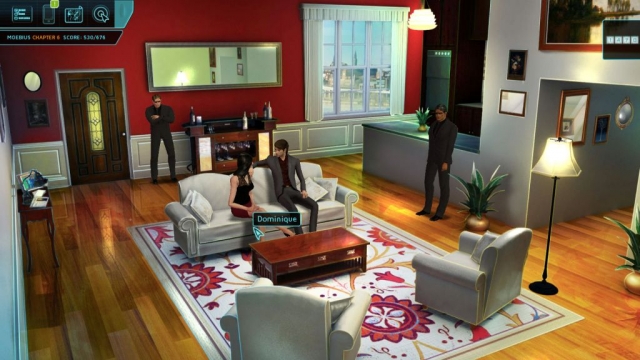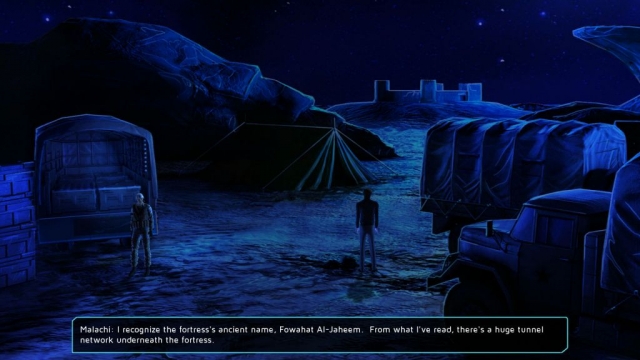Moebius: Empire Rising
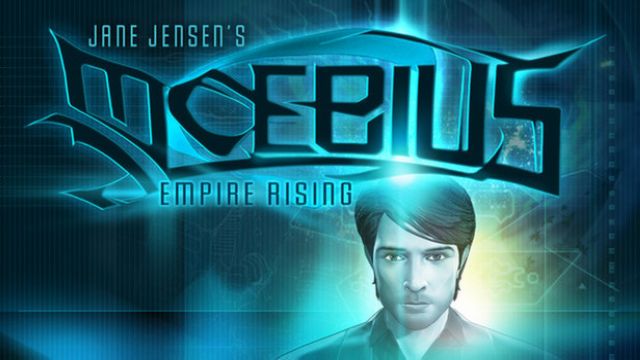
Moebius: Empire Rising is the first release from Pinkerton Road, a development house founded by Jane Jensen and her husband Robert Holmes. If the name Jane Jensen sounds familiar, it’s because she was the main creative force behind the Gabriel Knight mystery adventures, which were released between 1993 and 1999. If the name Jane Jensen doesn’t sound familiar, it’s because she hasn’t done much computer-game-wise since then, as she’s spent the last decade focusing mostly on casual games, although she does have one full adventure game, Gray Matter (released in North America in 2011), to her credit.
In Moebius, you control a genius antiques dealer named Malachi Rector. Malachi is sort of a Sherlock Holmes character. He’s not good at forming personal relationships, but he has a talent for spotting details and drawing inferences from them. This talent helps him in his work, because it enables him to detect the differences between true antiques and clever forgeries, and it keeps him much in demand, which in turn pays for his bills and more.
As Moebius opens up, Malachi is contacted by a secretive government bureau called FITA, the Future Intelligence Technology Agency. FITA believes that time is a like a moebius strip, and that human lives are endlessly repeated. That’s not to say they believe in reincarnation, where a person from the past lives a new life in current times. Instead, they believe that a person in current times will do the same things as a person from the past. The crux of this theory is that if you can detect who a person is repeating, then you can predict what they’ll do in the future, and you can put them in a position to do good or ill. It also lets you know who you can trust, as there’s a big difference between a person repeating Sir Galahad’s life versus one repeating Benedict Arnold’s.
FITA starts things out slowly with Malachi, as they simply ask him to investigate a recently-murdered woman and see if she was a match for Livia Drusilla, who was the wife of Augustus Caesar. This takes Malachi to Italy, where he uses his detection abilities to learn what he can about the woman — and where he also meets allies and enemies and gets embroiled in a pretty interesting thriller. The story is easily the best part of the game, as it is unique, unpredictable, and well-written — and also preposterous, but in good way. I enjoyed the story enough that it was worth the price of admission all by itself (which isn’t much of a surprise, given that Jane Jensen is just as much an author as a game developer).
That the story of Moebius works well is a good thing, because the puzzles in the game are complete non-entities. About half of the puzzles involve inventory management, where you pick things up and then use them in the right places, but the interface makes it clear exactly which things can (and can’t) be combined together and where inventory objects can (and can’t) be used, and since there are very few inventory objects at all, these puzzles are completely easy. The game comes with some sort of integrated hint system, but I turned it off when I started playing and then never came close to needing it.
The other half of the puzzles are where Malachi performs his analyses, either to generate a profile about a person, or to compare a person to a historical figure. These puzzles are more interesting, but they’re also easy because they’re basically multiple choice tests where you’re given an unlimited number of attempts to figure out the right answer. For example, during the profiling puzzles, you’re shown some characteristics about a person, and then you have to draw inferences about what you see. Each person has 3-5 characteristics, and each characteristic has 3 possible inferences (one of which is usually a joke or obviously wrong), so even if you have no idea what you’re doing, there are at most 32 possible answers, and you can figure it out by guessing.
The historical comparison puzzles are about the same way, except that each person only has at most a dozen possible historical matches, and you only have to guess the right one. That means even if you don’t bother to read any of the material used in the comparisons (which is a bad idea since they include interesting historical tidbits, like that Anne Boleyn was a gifted dancer and that Teddy Roosevelt liked Winchester rifles), it takes at most 12 tries to get the right answer. Ho hum. If there was any penalty for taking an excessive number of guesses for the profiling or comparisons, I didn’t detect it, but then I figured out most of them on the first or second try (for those of you playing along at home, I only had trouble profiling the librarian).
Technically, the game works well enough, but it isn’t anything special. The graphics show you what you need to see, and nothing is hidden in shadowy corners, but the character models are a little odd (Malachi made me think of clothes hanging on a line), and the lip-synching is poor (since the lips of the characters barely move at all). The interface is pretty standard fare for an adventure game. You left-click to move Malachi around, and when you left-click on a hotpot, a context-sensitive menu pops up letting know what you can do with it. Finally, the voice acting is solid. The characters are pretty believable in what they say and how they say it.
Overall, Moebius: Empire Rising is an interesting game. It has a premise that I’ve never seen anywhere before, in computer games or elsewhere, and Jane Jensen does a nice job of keeping you guessing about what’s going on and who’s good or evil, so the story carries you through the entire game. Unfortunately, the puzzles are just the opposite, only being worthwhile because of the historical data they include, and so Moebius is more of an interactive movie than a head-scratching adventure game. But at least it’s a good interactive movie, and so I’d say it’s worth its $30 suggested retail price (and more so now if you buy it while it’s 20% off).
Reviewed By: Steven Carter
Publisher: Phoenix Online Publishing
Rating: 82%
——————————————————————————–
This review is based on a digital copy of Moebius: Empire Rising for the PC provided by Phoenix Online Publishing.
 Game Over Online
Game Over Online